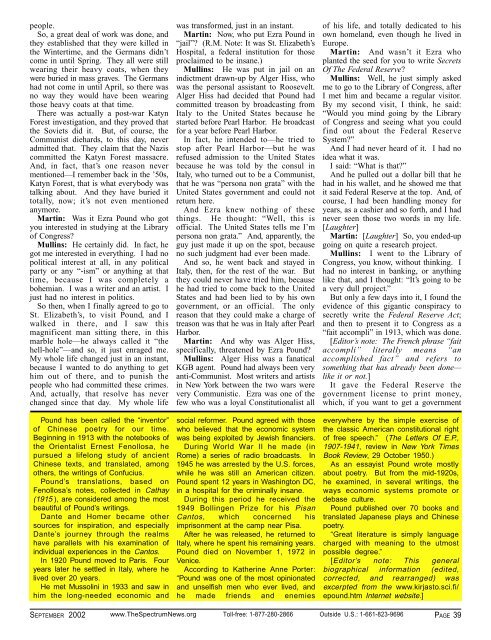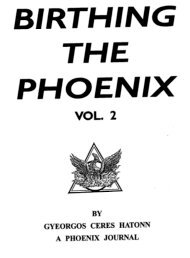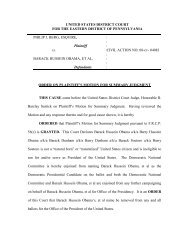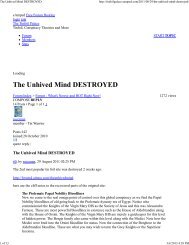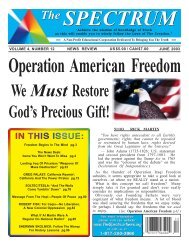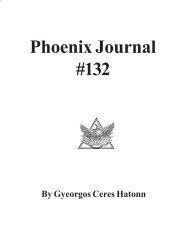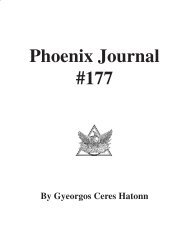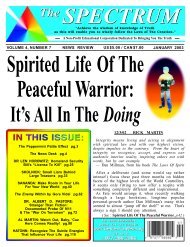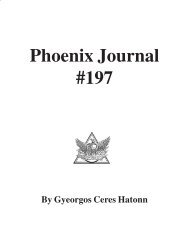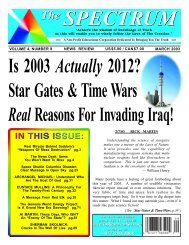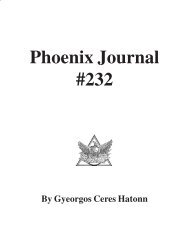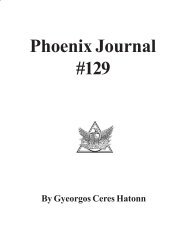Soldier Of Truth In A Lifelong Battle With Lies - Four Winds 10
Soldier Of Truth In A Lifelong Battle With Lies - Four Winds 10
Soldier Of Truth In A Lifelong Battle With Lies - Four Winds 10
Create successful ePaper yourself
Turn your PDF publications into a flip-book with our unique Google optimized e-Paper software.
people.<br />
So, a great deal of work was done, and<br />
they established that they were killed in<br />
the Wintertime, and the Germans didn’t<br />
come in until Spring. They all were still<br />
wearing their heavy coats, when they<br />
were buried in mass graves. The Germans<br />
had not come in until April, so there was<br />
no way they would have been wearing<br />
those heavy coats at that time.<br />
There was actually a post-war Katyn<br />
Forest investigation, and they proved that<br />
the Soviets did it. But, of course, the<br />
Communist diehards, to this day, never<br />
admitted that. They claim that the Nazis<br />
committed the Katyn Forest massacre.<br />
And, in fact, that’s one reason never<br />
mentioned—I remember back in the ’50s,<br />
Katyn Forest, that is what everybody was<br />
talking about. And they have buried it<br />
totally, now; it’s not even mentioned<br />
anymore.<br />
Martin: Was it Ezra Pound who got<br />
you interested in studying at the Library<br />
of Congress?<br />
Mullins: He certainly did. <strong>In</strong> fact, he<br />
got me interested in everything. I had no<br />
political interest at all, in any political<br />
party or any “-ism” or anything at that<br />
time, because I was completely a<br />
bohemian. I was a writer and an artist. I<br />
just had no interest in politics.<br />
So then, when I finally agreed to go to<br />
St. Elizabeth’s, to visit Pound, and I<br />
walked in there, and I saw this<br />
magnificent man sitting there, in this<br />
marble hole—he always called it “the<br />
hell-hole”—and so, it just enraged me.<br />
My whole life changed just in an instant,<br />
because I wanted to do anything to get<br />
him out of there, and to punish the<br />
people who had committed these crimes.<br />
And, actually, that resolve has never<br />
changed since that day. My whole life<br />
Pound has been called the “inventor”<br />
of Chinese poetry for our time.<br />
Beginning in 1913 with the notebooks of<br />
the Orientalist Ernest Fenollosa, he<br />
pursued a lifelong study of ancient<br />
Chinese texts, and translated, among<br />
others, the writings of Confucius.<br />
Pound’s translations, based on<br />
Fenollosa’s notes, collected in Cathay<br />
(1915 ), are considered among the most<br />
beautiful of Pound’s writings.<br />
Dante and Homer became other<br />
sources for inspiration, and especially<br />
Dante’s journey through the realms<br />
have parallels with his examination of<br />
individual experiences in the Cantos.<br />
<strong>In</strong> 1920 Pound moved to Paris. <strong>Four</strong><br />
years later he settled in Italy, where he<br />
lived over 20 years.<br />
He met Mussolini in 1933 and saw in<br />
him the long-needed economic and<br />
SEPTEMBER 2002<br />
was transformed, just in an instant.<br />
Martin: Now, who put Ezra Pound in<br />
“jail”? (R.M. Note: It was St. Elizabeth’s<br />
Hospital, a federal institution for those<br />
proclaimed to be insane.)<br />
Mullins: He was put in jail on an<br />
indictment drawn-up by Alger Hiss, who<br />
was the personal assistant to Roosevelt.<br />
Alger Hiss had decided that Pound had<br />
committed treason by broadcasting from<br />
Italy to the United States because he<br />
started before Pearl Harbor. He broadcast<br />
for a year before Pearl Harbor.<br />
<strong>In</strong> fact, he intended to—he tried to<br />
stop after Pearl Harbor—but he was<br />
refused admission to the United States<br />
because he was told by the consul in<br />
Italy, who turned out to be a Communist,<br />
that he was “persona non grata” with the<br />
United States government and could not<br />
return here.<br />
And Ezra knew nothing of these<br />
things. He thought: “Well, this is<br />
official. The United States tells me I’m<br />
persona non grata.” And, apparently, the<br />
guy just made it up on the spot, because<br />
no such judgment had ever been made.<br />
And so, he went back and stayed in<br />
Italy, then, for the rest of the war. But<br />
they could never have tried him, because<br />
he had tried to come back to the United<br />
States and had been lied to by his own<br />
government, or an official. The only<br />
reason that they could make a charge of<br />
treason was that he was in Italy after Pearl<br />
Harbor.<br />
Martin: And why was Alger Hiss,<br />
specifically, threatened by Ezra Pound?<br />
Mullins: Alger Hiss was a fanatical<br />
KGB agent. Pound had always been very<br />
anti-Communist. Most writers and artists<br />
in New York between the two wars were<br />
very Communistic. Ezra was one of the<br />
few who was a loyal Constitutionalist all<br />
social reformer. Pound agreed with those<br />
who believed that the economic system<br />
was being exploited by Jewish financiers.<br />
During World War II he made (in<br />
Rome) a series of radio broadcasts. <strong>In</strong><br />
1945 he was arrested by the U.S. forces,<br />
while he was still an American citizen.<br />
Pound spent 12 years in Washington DC,<br />
in a hospital for the criminally insane.<br />
During this period he received the<br />
1949 Bollingen Prize for his Pisan<br />
Cantos, which concerned his<br />
imprisonment at the camp near Pisa.<br />
After he was released, he returned to<br />
Italy, where he spent his remaining years.<br />
Pound died on November 1, 1972 in<br />
Venice.<br />
According to Katherine Anne Porter:<br />
“Pound was one of the most opinionated<br />
and unselfish men who ever lived, and<br />
he made friends and enemies<br />
of his life, and totally dedicated to his<br />
own homeland, even though he lived in<br />
Europe.<br />
Martin: And wasn’t it Ezra who<br />
planted the seed for you to write Secrets<br />
<strong>Of</strong> The Federal Reserve?<br />
Mullins: Well, he just simply asked<br />
me to go to the Library of Congress, after<br />
I met him and became a regular visitor.<br />
By my second visit, I think, he said:<br />
“Would you mind going by the Library<br />
of Congress and seeing what you could<br />
find out about the Federal Reserve<br />
System?”<br />
And I had never heard of it. I had no<br />
idea what it was.<br />
I said: “What is that?”<br />
And he pulled out a dollar bill that he<br />
had in his wallet, and he showed me that<br />
it said Federal Reserve at the top. And, of<br />
course, I had been handling money for<br />
years, as a cashier and so forth, and I had<br />
never seen those two words in my life.<br />
[Laughter]<br />
Martin: [Laughter] So, you ended-up<br />
going on quite a research project.<br />
Mullins: I went to the Library of<br />
Congress, you know, without thinking. I<br />
had no interest in banking, or anything<br />
like that, and I thought: “It’s going to be<br />
a very dull project.”<br />
But only a few days into it, I found the<br />
evidence of this gigantic conspiracy to<br />
secretly write the Federal Reserve Act;<br />
and then to present it to Congress as a<br />
“fait accompli” in 1913, which was done.<br />
[Editor’s note: The French phrase “fait<br />
accompli” literally means “an<br />
accomplished fact” and refers to<br />
something that has already been done—<br />
like it or not.]<br />
It gave the Federal Reserve the<br />
government license to print money,<br />
which, if you want to get a government<br />
everywhere by the simple exercise of<br />
the classic American constitutional right<br />
of free speech.” (The Letters <strong>Of</strong> E.P.,<br />
1907-1941, review in New York Times<br />
Book Review, 29 October 1950.)<br />
As an essayist Pound wrote mostly<br />
about poetry. But from the mid-1920s,<br />
he examined, in several writings, the<br />
ways economic systems promote or<br />
debase culture.<br />
Pound published over 70 books and<br />
translated Japanese plays and Chinese<br />
poetry.<br />
“Great literature is simply language<br />
charged with meaning to the utmost<br />
possible degree.”<br />
[Editor’s note: This general<br />
biographical information (edited,<br />
corrected, and rearranged) was<br />
excerpted from the www.kirjasto.sci.fi/<br />
epound.htm <strong>In</strong>ternet website.]<br />
www.TheSpectrumNews.org Toll-free: 1-877-280-2866 Outside U.S.: 1-661-823-9696<br />
PAGE 39


